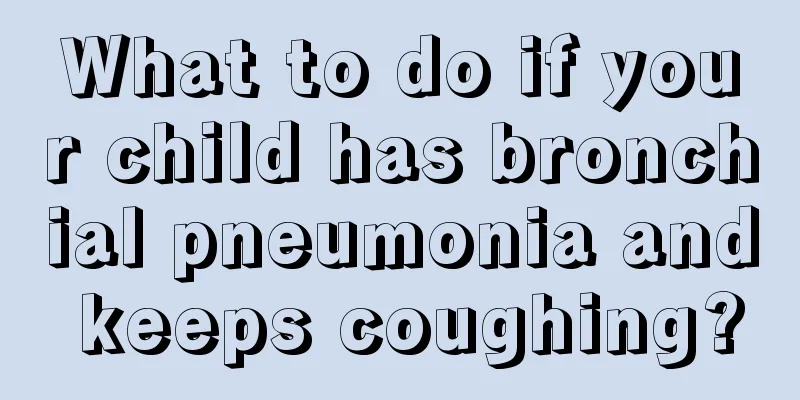What to do if your child has bronchial pneumonia and keeps coughing?

|
Many children cannot avoid coughing, and some parents habitually give their children some cough medicine. But if it is serious, it will become bronchopneumonia. Parents often worry about what to do when their children’s cough due to bronchial pneumonia doesn’t get better. Children with this disease will inevitably cough violently at night, and may even vomit out all the food they ate during the day. The children become listless, which is really distressing for their parents. So what should we do if our child suffers from bronchial pneumonia and coughs that don’t go away? Let’s take a look at what the following introduction is like. 1. Lifestyle adjustment Avoid eating spicy and irritating foods, not too sour or salty foods, and those with a history of allergies should avoid eating seafood and allergenic foods. Keep the indoor air fresh, avoid smoking and drinking, and avoid stimulation from physical and chemical factors such as smoke, odor and oil fumes. Prevent colds, strengthen cold-resistant exercises, pay attention to the balance between work and rest during the remission period, and exercise appropriately to strengthen your physical fitness. If you often sweat spontaneously, you can take Yupingfeng Powder if necessary. 2. Diet adjustment The diet should be light, nutritious and easily digestible. Eat regularly and in moderation, eat small meals frequently, avoid overeating, and avoid eating raw, cold, greasy, spicy or hot foods. Acute bronchitis can be divided into three types: wind-cold, wind-heat, and dryness-heat. Choosing medicated food according to the type of diet can achieve good results. 3. Sweet almond porridge This recipe comes from the ancient recipe "Food and Medical Mirror". The recipe is 15g of almonds, peel and tip, grind with water to filter out the juice, add 50g of white rice, and cook into porridge for consumption. Or you can grind almonds and rice into powder using a stone mill. During the grinding process, continuously add small amounts of water. When boiling, add white sugar to make almond paste, which has the same function as above. Note: Sweet almonds are sweet and mild in nature. They can moisten the lungs and relieve asthma, nourish the spleen and stomach, and moisten the intestines and promote bowel movements. It can also dispel wind and cold. Almonds contain fat, protein, amino acids and trace amounts of amygdalin. Its lung-moistening and asthma-relieving effect is related to amygdalin. Rice is sweet and mild in nature. It can benefit the spleen and stomach. It can also treat heat damaging the stomach yin, thirst and dry mouth. Overall, this prescription is quite suitable for wind-cold type bronchitis, especially for those with chest tightness, asthma or constipation. People with yin deficiency, cough and loose stools should not take it. Wind-cold type bronchitis is caused by wind-cold invading the lungs, and often occurs after a cold. At this time, there may still be mild fever, fear of cold, headache, nasal congestion, new cough, thin sputum, thin white tongue coating, and floating and tight pulse. Medicinal diet should focus on dispersing wind and cold, promoting lung function and relieving cough. In addition to this recipe, you can also use scallion and fermented black bean soup, ginger and sugar drink, scallion porridge, etc. 4. Honey and Silver Flower Dew Add 30g of honeysuckle to 500ml of water, boil the juice and remove the residue. After cooling, add 30g of honey, mix well, and take it in 3 times. Note: Honeysuckle is sweet in taste and cold in nature, with a fragrant smell. It can clear away wind and warm heat, and detoxify the blood. According to modern pharmacological research, honeysuckle has a strong antibacterial effect on hemolytic streptococci, pneumococcus, Staphylococcus aureus, Escherichia coli, etc. Honey is mild in nature and sweet in taste. It has the functions of nourishing the middle and moistening dryness, detoxifying and relieving pain. In this prescription, it plays the role of moistening the lungs and relieving cough. According to modern research, in addition to a variety of sugars, honey also contains inorganic salts and enzymes, which have a certain bactericidal effect. Overall, this prescription is quite suitable for wind-heat type acute bronchitis, and should also have certain effects on preventing influenza and treating cough. The symptoms of wind-heat type acute bronchitis are: cough with thick sputum, sore throat, high fever, thin yellow tongue coating, and floating and rapid pulse. This disease is caused by wind-heat invading the lungs, so the medicinal diet should use products that can dispel wind and heat, relieve exterior symptoms with pungent and cool taste, and clear the lungs and relieve cough. 5. Apricot and pear syrup 10g almonds, remove the skin and crush them; take another large duck pear, remove the core and cut into thin slices, mix the two, add half a bowl of water and cook together. When the duck pear is cooked, add rock sugar until it is delicious and drink. Note: Duck pears are sweet, slightly sour and cool in nature. It can clear away heat, promote body fluid, moisten dryness and resolve phlegm. This recipe uses Beijing pears or white pears, not sand pears. Almonds are divided into sweet and bitter types. The one used here is bitter almonds, also called northern apricots. They taste bitter and spicy, are warm in nature, and are slightly toxic. They can clear the lungs and moisten the intestines, relieve cough and asthma. In this recipe, they are combined with pears to moisten the lungs and resolve phlegm. Therefore, this prescription is quite suitable for acute bronchitis of dryness and heat type. This prescription is not suitable for people with wind-cold cough. The symptoms of dry-heat type acute bronchitis are: dry cough without sputum, or little and thick sputum that is difficult to cough up, dry mouth and tongue, thin and dry yellow tongue coating, dry stool, and yellow urine. This is due to dryness and heat in the lungs which damages the body fluids, so the treatment should be to clear away heat, produce body fluids, moisten the lungs and relieve cough. It is worth mentioning that patients with acute bronchitis should eat a light diet, eat more fresh vegetables and fruits, and drink more light tea. Avoid greasy, fried or other foods. The above are some dietary therapy methods for what to do if children with bronchial pneumonia cough does not get better. I hope this can help all the babies who have this disease. In fact, no matter how good the prescription is, it still requires the patient to cooperate with the treatment. It has been clearly mentioned above that during illness, you should never eat food that is too cold or too spicy. Try to avoid smoke and dust in your environment. As parents, we should always pay attention to our children's health and not let them be troubled by unnecessary diseases. |
<<: What should children eat to improve their physical fitness?
>>: Is it normal for a two month old baby to have teeth?
Recommend
Does a one-year-old baby need to go to the hospital if he coughs at night?
Many female friends who have just become mothers ...
Symptoms of mild hand, foot and mouth disease
Hand, foot and mouth disease can easily affect th...
What is the reason for the dry lips of a 3-year-old baby?
The body resistance of babies is very weak, so th...
Baby's forehead is hot and his hands and feet are cold
If you find that your baby has a hot forehead and...
What to do if your child wets the bed at night
Bedwetting is clinically known as enuresis, and m...
What should I do if my child’s hand is fractured or dislocated?
The human hand is a part of the body that is pron...
What to do if your baby's teeth are calcified
We all know that oral hygiene issues for babies s...
Baby has diarrhea after taking jaundice medicine
Nowadays, many newborns have severe jaundice, so ...
How to treat urticaria in children?
Children are the treasures of the family. Family ...
How to judge whether it is normal for the baby's belly to rise and fall when breathing
Now, actually, if you want to know whether the ba...
Childhood obesity is harmful: Five strategies to prevent it
Due to lack of sufficient nutritional knowledge, ...
How can children protect their teeth?
We all know that children have no resistance to s...
What to do if your 6-year-old child is disobedient
There is no child who is not annoying. Although p...
What are the early symptoms of asthma in children?
Children with asthma are prone to attacks if pare...
Children's lymphocyte absolute value is high
Because children are young, their body resistance...









